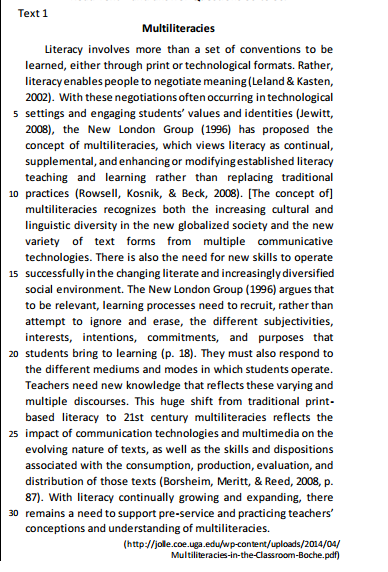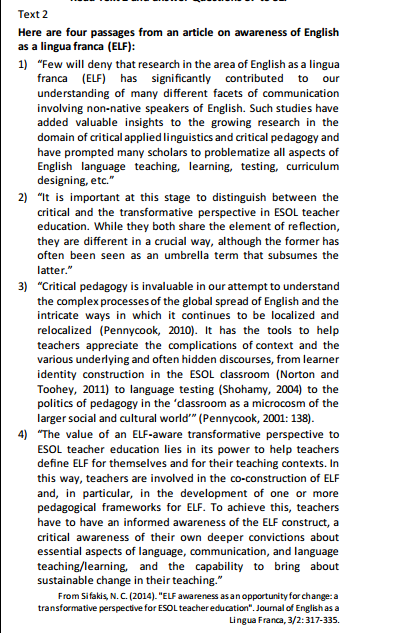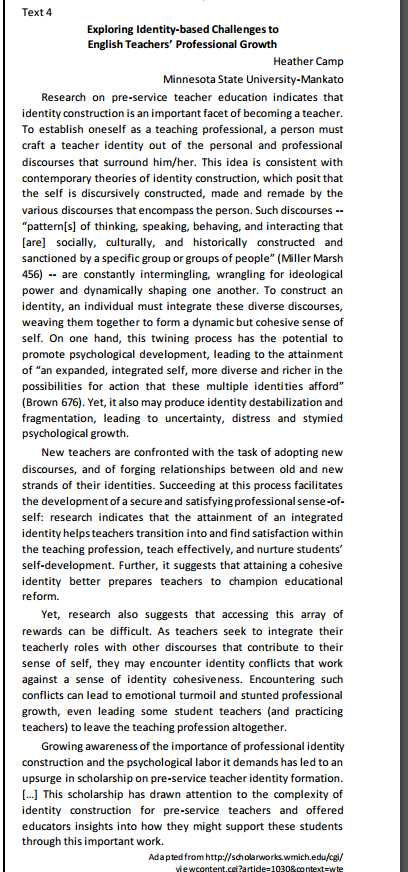According to Duboc (2016, p. 62), critical literacy differs from critical reading as the former holds that:
According to Jordão (2013), critical pedagogy differs from structuralist pedagogies because, among other reasons, it
Critical literacy emphasizes the need to use language as a vehicle for social change. One of the strategies a teacher may use for this purpose is
In a classroom situation in which the student asks the teacher if British or American pronunciation should be preferred, the most adequate answer the teacher should give, from a postcolonial orientation, is:
Duboc (2016, p. 65) mentions three generations of evaluation
practices.
Match the frameworks and the focus of their methods:
1- Behaviorism
2- Constructivism
3- Sociocultural theories
( ) Learner-centered methods
( ) Language-centered methods
( ) Learning-centered methods
Indicate the option that shows the correct matching, from top to
bottom.
Bohn (2013, p. 83 and 90) argues that in Brazil teacher identity has been strongly influenced by
In the passage “To be relevant, learning processes need to recruit, rather than attempt to ignore and erase, the different subjectivities, interests, intentions, commitments, and purposes that students bring to learning” (L.17-20), the author implies that teachers should
Passage 4 suggests that a transformative perspective to ESOL teacher education requires that teachers become more
Critical literacy supporters tend to see the discourse of “the now ‘classic’ critical pedagogies of the 80s and 90s” (Jordão, 2013, p. 290) as being
It is currently assumed that the teaching/learning of English as a
Foreign Language in Brazilian public schools has not been
successful (Jordão, 2013, p. 286-287).
Read the statements below and mark them as TRUE (T ) or
FALSE (F ).
( ) Teachers’ lack of qualification may contribute to this
perception.
( ) This is because local cultures and discursive practices are
disregarded.
( ) To solve this problem, basic rules of grammar and vocabulary
should be taught.
The statements are, respectively:
From the point of view of more recent pedagogies, the teacher’s statement is rather
In the context of Text 4, the fragment “Yet, research also suggests that accessing this array of rewards can be difficult.” introduces (an)
Read the following extract from Text 1: “Multiliteracies
recognizes both the increasing cultural and linguistic diversity in
the new globalized society and the new variety of text forms from
multiple communicative technologies.” (L.11-14)
The alternative from Lotherington (2006) that has some analogy
to this passage is:
As regards Passage 2, analyse the assertions below:
I. A critical orientation may include a transformative view.
II. Critical and transformative perspectives in ESOL are
indistinguishable.
III. Transformative perspectives are wider than critical
orientations.
Choose the correct answer:
Consider the following statement: “the teaching of a foreign
language […] tends to place ‘non-natives’ locally involved in the
process of teaching/learning in a subordinate position when
confronted with the authority attributed to the ‘natives’ in what
is considered ‘their own language’” (our translation) (Jordão,
2013, p. 280).
Here, the writer is attributing this view to





